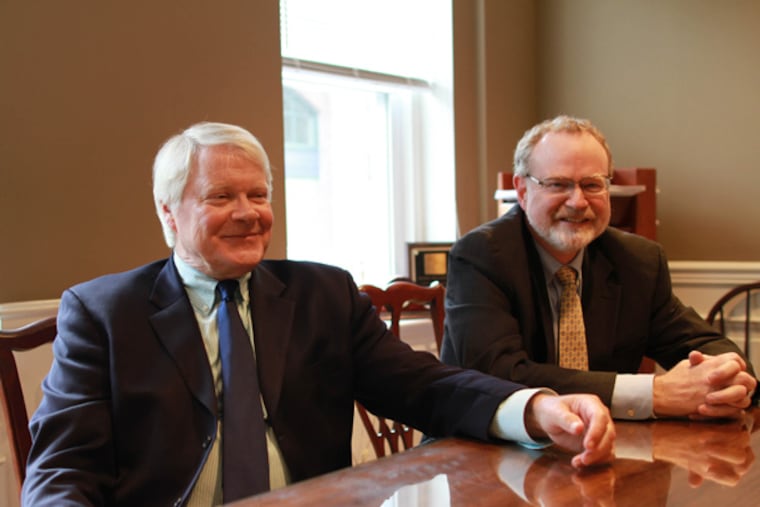Sandusky prosecutor turns to quieter legal life in Berwyn
Joseph McGettigan assumed he was getting into a low-profile case. "I thought, the guy's a retired coach and not even head coach," McGettigan said last week. "I thought it would get maybe three stories in the Centre Daily Times," the State College, Pa., newspaper.

Joseph McGettigan assumed he was getting into a low-profile case.
"I thought, the guy's a retired coach and not even head coach," McGettigan said last week. "I thought it would get maybe three stories in the Centre Daily Times," the State College, Pa., newspaper.
The "coach" in question, of course, was Jerry Sandusky, and McGettigan, the chief prosecutor, became a central figure in a case that became a national sensation.
As the Sandusky scandal exploded, eventually bringing down famed Pennsylvania State University football coach Joe Paterno and three of the school's top leaders, it became a media spectacle that rivaled nothing McGettigan had witnessed since he prosecuted multimillionaire John E. du Pont more than a decade earlier.
Now, a year after a trial that enthralled much of the country and the sports world and ended with Sandusky's 30- to 60-year prison sentence for child sexual abuse, McGettigan has stepped back into a more anonymous life at a law practice in Berwyn.
As a member of McAndrews Law Offices, he works alongside his former co-counsel in the du Pont case, Dennis McAndrews. He is focusing on cases involving victims of abuse that occurred in institutional settings, such as schools, colleges, and religious organziations.
"I love it," McGettigan said of the job he has held since April. "I couldn't be happier."
Born and raised in Philadelphia, McGettigan, 64, worked in the U.S. Attorney General's Office and the U.S. Attorney's Office, and served as a district attorney in Delaware County and Philadelphia. He also worked in Hollywood as a legal consultant, and wrote for the short-lived 2001 legal drama Philly, which was filmed locally. McGettigan graduated from Temple University with a degree in English literature, and from the University of San Diego School of Law.
He and McAndrews together took on the prosecution of du Pont, the chemical-company heir who murdered Olympic champion wrestler David Schultz in 1996 at his mansion in Newtown Square.
The case was sensational, and the coverage relentless. Stories soon emerged of du Pont's erratic behavior, and his attorneys argued he was not guilty by reason of insanity. Everyone wanted to discuss the case, and McGettigan said he and McAndrews even caught people in lies in attempts to get on the jury.
From that case, McGettigan learned to focus on the outcome and ignore distractions. He also said he learned to "make sure he was sitting next to the smartest person in the room," who, in that case, was McAndrews in his view.
"Prosecutors in high-profile cases can lose their way," McGettigan said. "There are people who start thinking the media are hanging on their every word because they're filled with wisdom.
"With du Pont," McGettigan said, "we decided we were not going to lose our way."
Jurors found du Pont mentally ill but guilty. He was sent to prison, where he died in 2010.
McGettigan was approached by former federal prosecutor Frank Fina in fall 2011 as the Sandusky case was unfolding. With Fina, McGettigan said, he again found himself seated next to one of the best.
"He was the driving force," McGettigan said of Fina. "Sometimes the hardest part of a case is getting it to trial."
As McGettigan started the painstaking process of preparing Sandusky's victims to testify, he began all the meetings by saying that he would not force them to testify and that they didn't even have to talk to him if they didn't want to.
"I told them it was a decision they had to make on their own," he said. "I'm not going to force harm on you. One of the most important things you can do, especially with victims of sexual abuse, is to give them back some power in their lives. And if it was going to do them more harm than good, I didn't want them to testify."
As the case moved toward trial, some of the young men became aware that defense attorneys and some in the Penn State community questioned their credibility. Many were nervous and reluctant.
"No one wants to review the details of their victimization," McGettigan said. "And it was difficult for me. You don't like being the instrument of someone's pain."
One of the eight victims who testified had misgivings the night before he was to go on the stand, and he called McGettigan to say he didn't want to do it. He ended up going to McGettigan's hotel, where they sat outside and talked.
They didn't discuss the case much, McGettigan said. He just asked the man to think about what impact his decision to testify would have on him, rather than on the case. Would he regret testifying? Would he regret not testifying?
In the end, McGettigan said, that witness took the stand.
McGettigan opened the trial by displaying childhood photographs of Sandusky's victims as they had appeared at the time the abuse took place.
"As adults, some of these men may have looked like they could defend themselves," said McAndrews, who attended court for the opening and closing arguments. "Without showing those pictures at the outset, the evidence wouldn't have had the same impact."
As McGettigan made his closing remarks 10 days later, McAndrews said he could tell which way the verdict would swing just by looking at the jurors.
"There was this one juror who was hanging on Joe's every word, just watching him the whole time," he said.
When Sandusky's attorney stood up and started talking, McAndrews said, "that juror never made eye contact once."